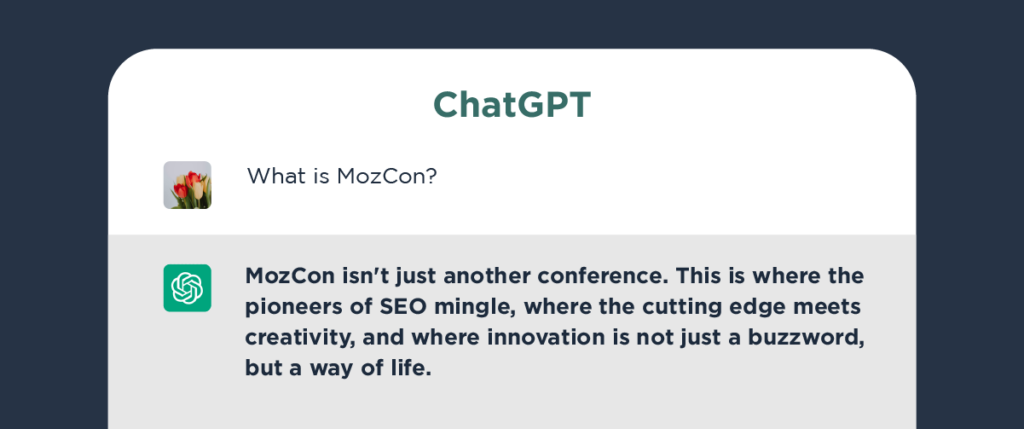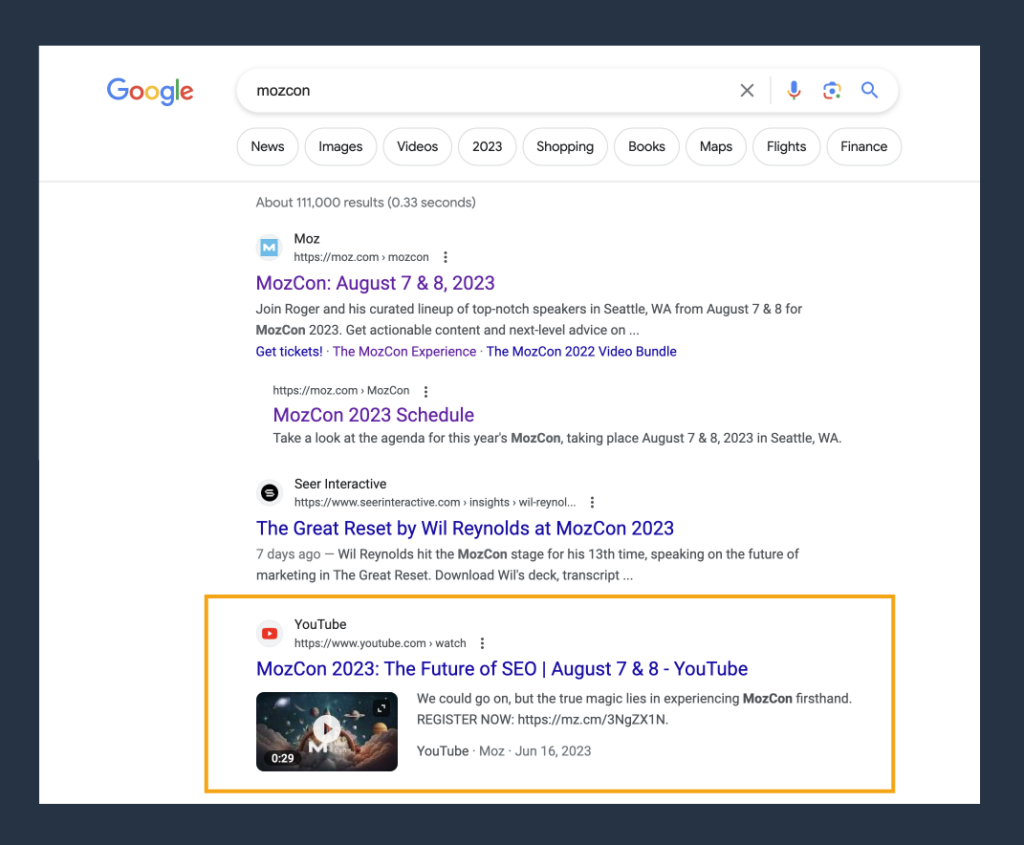MozCon isn’t just another conference. This is where the pioneers of SEO mingle, where the cutting edge meets creativity, and where innovation is not just a buzzword, but a way of life. ~ Courtesy of ChatGPT
2023’s Burning Topic: AI
To no surprise, the hot topic of the conference was AI, which by the way, wrote the very dramatic introduction to MozCon above.
Speakers came from all over the world and touched upon the subject. Topics ranged from how AI has become a part of daily search on Bing and Google and how marketers are using it to find efficiencies to how it’s being used for innovation and how far it still needs to go to meet our standards. Some of the ways ChatGPT and other tools are being used was inspiring, a little spooky, and definitely sparked a few ideas for how I can use it in my own workflow.
However, I couldn’t help but notice the glaring exclusion from every mention of AI—the ethics. As a B Corp, ethics are at the forefront of what we do at Mad Fish. What was lacking from the conversations about creating 500 pieces of content in one hour, or the 30-minute creation of a marketing asset that took a team of designers, photographers, and thousands of dollars, were the faces behind that hard work.

Yes, it is quick, easy, and cheap(er) to cut out the middleman and use AI. However, that middleman has a face with a mouth to feed and maybe a family to provide for. Keep in mind, work that AI produces isn’t technically original. AI was ‘trained’ by the millions of hours of work put in by actual people. But as one person said at our lunch conversation, ‘Pandora’s box is already open. There’s no taking it back.’ And so yes, I do plan on figuring out where AI has a place in SEO at Mad Fish, but not without the guiding principles of ethics, morality, and empathy.
Aside from the conversations around AI, I walked away with a new excitement for SEO and an appreciation for those who are pushing the boundaries of what it means to work in ‘search engine optimization.’ I chatted with marketers from all over the world, both in-house and at agencies as well as business owners, directors, and some folks who were just getting started.
Below are just a few things I learned.
The best defense is offense.
Chris Long from Go Fish Digital, whose speech was literally titled ‘the best defense is offense,’ made the point that SEOs are constantly on the defensive trying to defend strategies at the drop of a keyword, which leaves little time for offense.
Naturally, it’s a given that your agency should be coming up with new ideas based on the changing landscape. However, most client engagements only have a couple of hours dedicated to reporting and other tasks like addressing response codes, and putting out fires from those infinite Google Search Console email alerts.
Chris shared ideas around content, technical SEO prioritizations, experiments and, of course, AI. It was a validating speech as this last year our team worked to revise how we price SEO services to allow for more time for offensive strategies and I’m excited to see how that plays out.
SEO is more than traditional blue links.
At the forefront of Google’s evolution is the user experience. It’s moved away from traditional blue links and become a platform with the ultimate user experience in mind. This is why the new search engine results page (SERP) sports features like shopping, maps, travel, video, images, and news. Every search triggers a different type of result based on the user intent behind a particular query.
As more and more users find new ways to search (Hello, TikTok!) and more crave first-hand experiences, SEOs need to look outside of traditional techniques and more to where their customers live online. With Google’s new Search Generative Experience pushing blue links further out of a user’s view, SEOs need to consider how else they can get in front of their customers.
Posting blogs just isn’t enough anymore.
It seems obvious but it’s a conversation I actually have quite often with potential clients when they say ‘I need SEO’. They immediately think about content in traditional text format only. And yes, this type of content is invaluable and I will almost always recommend it, but it’s one spoke on the wheel.
If we think about how users are consuming information, there’s a reason TikTok, Instagram, YouTube, and Pinterest are all so popular—people want visuals and, to be more specific, they want video.
According to Carrie Rose, CEO of Rise at Seven, video in the SERPs increased 45% YoY, which is huge! To ignore YouTube and TikTok is to risk losing out on an immeasurable number of potential customers.
SEOs know what users want.
In her speech, Carrie Rose talked about SEOs needing to have a more prominent voice at the decision-making table. She made the point that we know what customers want. We are in the SERPs every day, looking at keyword data, what type of content people are clicking on, whether they prefer video or images, etc. Unfortunately, we’re typically isolated from campaign planning because again, most people associate SEO with text content and don’t think about the other ways we can contribute to the larger conversation.
With online competition being what it is, it’s imperative for brands to take an omnichannel approach. We know what users are searching for on and off the site. This information can help with email marketing phrasing, knowing what type of inventory to push on social media, what keywords to use in paid media campaigns based on organic competition, and so much more. And with Carrie’s impressive track record, including working with major global brands, I’d say she’s on to something.
We always need to ask ‘why.’
I’ll end on one of my favorite takeaways that wasn’t technical at all. In fact, it wasn’t as much a takeaway as a reminder.
Noah Learner from Sterling Sky talked about his career path in SEO and how it was always driven by his ‘why.’ His ‘why’ was to own a house, have a wife, kids, and pets. His ‘why’ was not very far off from my own. I appreciated his speech because it was a good reminder that, despite the hours of conversations about language learning models, extracting and manipulating data, and algorithms, we are in fact all human.
Sometimes I need a reminder that behind every click, query, and dollar spent is another human with their own ‘why.’
Find the ‘Why’ Behind Your Customers: Connect With Our SEO Team
We’d love to chat with you about your current SEO approach and goals to see if we’re a good fit for a collaborative partnership. Learn more about our SEO services.
Set up a complimentary SEO consultation to get started.


